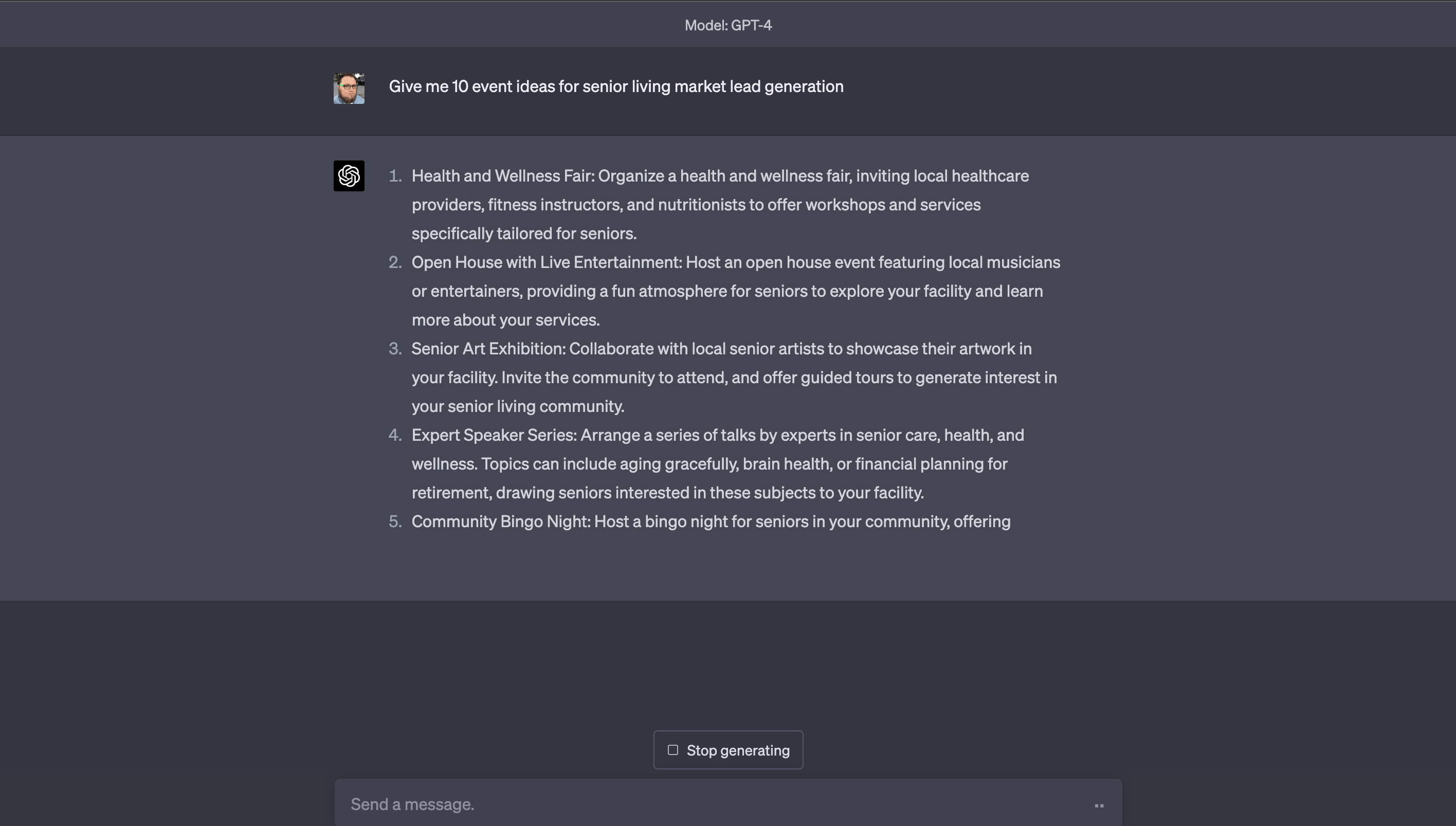ChatGPT: Reframing How We Work
May 5, 2023
7 minute read
Share this Post:
Not every notable technological awakening necessarily signals the potential for a dystopian “rise of the machines.” ChatGPT/OpenAI bursting on the scene has raised eyebrows and, in its present relative infancy, caused no small amount of speculation over what it might usher in and how we might use it. As the early first consumer applications come online, and despite a multitude of interesting prognostication, much of this is unknowable at this point. It is, as a recent Wall Street Journal OP-ED remarked, “an inhuman analogue to cognition.” So, ChatGPT needs to be cultivated, cared for, and fed, understood, and revealed to be embraced and productively controlled. Perhaps what can be said with relative certainty is that as public awareness, understanding, and application continue to build, we are at an inflection point.
As an outcomes obsessed, customer experience and digital performance marketing agency, we can imagine significant potential with ChatGPT fundamentally as a tool, accelerator, distillation source and as a streamlined, ordered approach to many things: from blogging to developing optimal user experience test cases (UX) and website coding to revealing the genesis of a brand’s strategy and its foundational insight to content strategy and creation to paid media and iterative analytics. In the world of performance marketing, consider, for example, some low-hanging fruit that ChatGPT can immediately contribute to SEM:
- Keyword Research and Search Volume Prediction
- Enhanced ability to craft ad copy, descriptions, and, headlines
- CTAs for (paid search) campaigns
- A/B Testing and Research
- Campaign Troubleshooting
- Overall enhanced boost-ability
From a marketing perspective, and while ChatGPT as new AI can guide, distill, and accelerate, we should continue to challenge the outputs to frame better, more human-centric and, in our clients’ interests, insight-driven results that create measurable commercial impact. This is where smart governance comes into play, and not insignificantly, how we might implement and standardize a process – and a state-of-flow – to realize increased output with quality. As described later in this article, success and efficacy may ultimately depend on what is put in, in order to optimize what comes out of this platform.

As the “what” continues to take shape, it’s more the “how” that will arguably fuel ChatGPT’s development and sustained, sticky embrace (or resistance). In the classic, early 20th Century, courtroom dramatic play Inherit The Wind, the defense attorney points out that progress never counts the cost: “…you want the telephone? Then you lose privacy and the charm of distance.” “…you wish to fly? Then the birds will lose their wonder and the clouds will smell of gasoline.” The price we pay for innovation – and ChatGPT is not excepted – depends on the propensity that innovation has to be a force for improving and adding value to our own multi-faceted and increasingly complex existence. ChatGPT’s underpinnings as a generative source of knowledge is exponential: the more we use it, the more we feed its expansiveness and the potential to enhance and sharpen what we do. That, in our view, is exciting. ChatGPT, like any good strategic tool, just has to “help solve the problem.”
In the end, significant innovation – particularly in technology, science, and medicine – always comes down to how humans manage these great leaps forward. This can be said about everything from the Gutenberg press…to atomic energy…the internet…or the human genome. Innovation and its ultimate success (and utility) will always be dependent on human judgement, temperament, ethics, context, intuition, experience and yes, reason. ChatGPT is no less subject to these same factors. It has not achieved sentience – at least not yet. Far from it. There are blind spots and limitations to be sure.
At this stage of its development, efficacy may seem to depend on how we query ChatGPT. As ChatGPT is wholly based on and is a product of known data and existing knowledge, asking counter-intuitive questions may bend this as a tool to help us to see things in a new way. Otherwise, ChatGPT will likely only tell us what we already know. Its abilities are not the product of some innate, independent intelligence, but rather of an immense scale, composed of everything on the internet, that could mask itself as original thinking. It’s exciting to think that an intentional and practiced use of this model will help facilitate any number of insights and new ways of doing things – across business practices. Or, as global strategy consultant Julian Cole would describe an insight,“…something revealed and that reframes the world in a new way and that delivers an ‘ah-ha!’” ChatGPT has every potential to achieve this.

There is more to come. And, it can be reasonably said that ChatGPT as it exists today, is probably the worst it will ever be. Next up: ChatGPT-4. Continually impressive and brimming with possibility. This next generation is reportedly capable of describing images and their logical interactions. Perhaps one step closer to reasoning ability, e.g., images of food in a kitchen revealing recipe and meal ideas. Or, inputting a patient’s medical history only to receive back an accurate and standard-of-care-based course of treatment (this has been tested and validated by physicians). How about acing standardized tests and doing reasonably well on bar exam questions? AI technology is being continually integrated into search and productivity tools in a wide variety of fields from logistics and tax prep to marketing, healthcare, and video games. However, even ChatGPT-4 still has limited reasoning ability. It can’t, for example, hypothesize about the future or form entirely new ideas – and generally still “hallucinates” (it can’t really discern what is objectively true and what is not).
The cost-benefit of human strategic ability, paired with smart automation, in our estimation, pays out as a way of amplifying human endeavor. ChatGPT/Open AI feels more like the rise and elevation of humans – not the machines.
Nonetheless, and even with the expected fits and starts that underly the advent of any new technology under the sun, the operative word for this transformative new phenomenon may continue to simply be: “yet.”
*Note: No ChatGPT/OpenAI queries were used in the writing of this piece.
Designing for the User: Creating Effective Website Experiences
Designing for the User: How Data-Driven Research and Content Analysis Shape Effective Website Experiences A well-designed website is more than a...
Google Implements Continuous Scroll on Mobile Searches
Last month, Google announced its latest interface update - continuous Google Search scroll on mobile devices. Instead of having to navigate to the...

